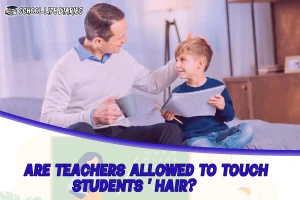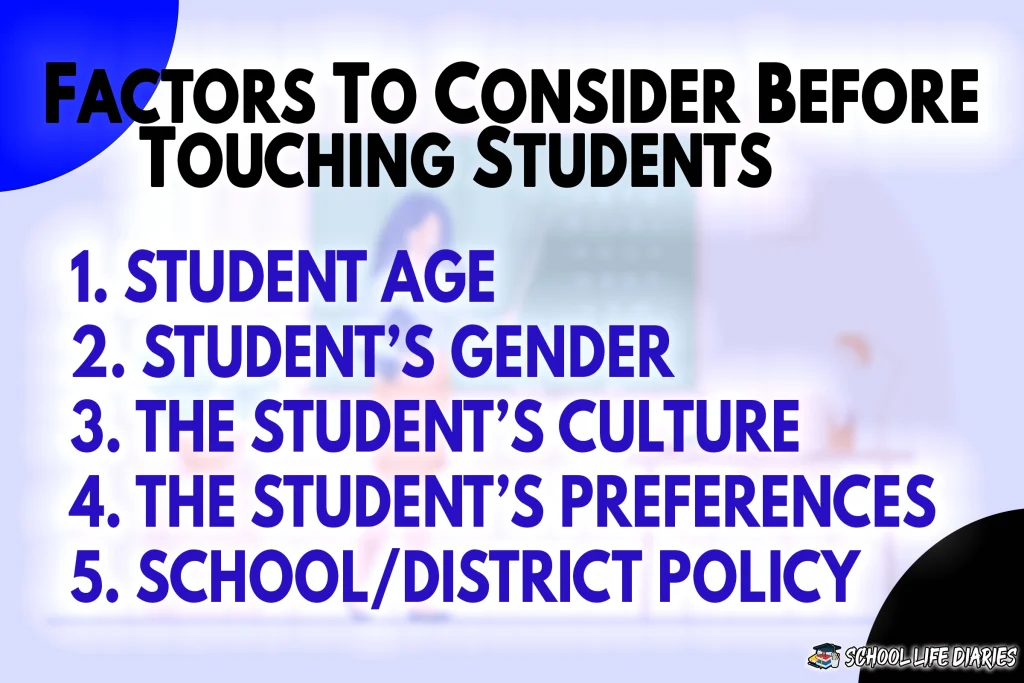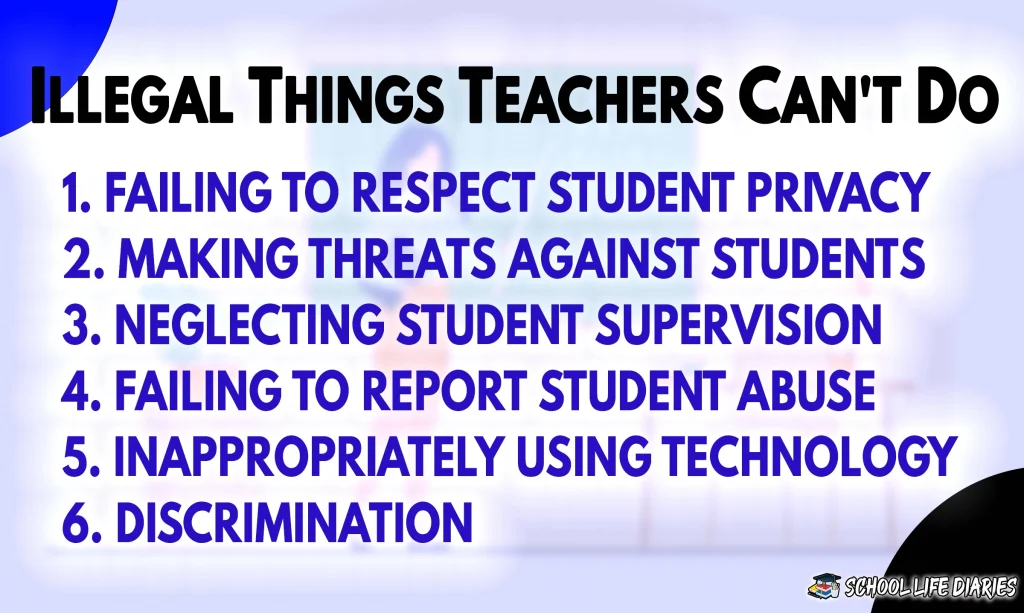It depends on the individual situation and the relationship between the teacher and the student. Some people believe that teachers should absolutely not be allowed to touch students under any circumstances, while others feel that a gentle pat on the back or touch on the arm can be a way of showing support or appreciation. It is up to the school or district to create policies regarding teacher-student touching, and it is up to each individual teacher to use their best judgement when interacting with their students.
In any case, teachers should make sure that their actions are appropriate, and that they respect the boundaries of their students. If a teacher does decide to touch a student in any way, it is important for them to be aware of how the student may interpret their action and respond accordingly.
Factors To Consider Before Touching Students
Touching students can be a tricky business, and it’s important to weigh all the factors before taking any action. Before touching a student, there are a few things that teachers should consider.
1. Student Age:
Student age plays a key role in determining if physical contact is appropriate or not. Younger students should have less physical contact with teachers than older ones. As students’ ages increase, the types of physical contact that may be appropriate can also increase, such as a pat on the back or an arm squeeze to provide encouragement or comfort.
- Kindergarten Students:
Kindergarteners may not be able to communicate effectively if they are touched inappropriately, and may not be able to understand what is happening to them.
- Middle Grades:
Middle schoolers are developing their identity and may be more susceptible to negative comments or touches from adults than other students.
- Higher Grades:
High schoolers are often entrusted with taking care of themselves and may feel uncomfortable if an adult is touching them in a way that is not appropriate.
2. Student’s Gender:
Student gender identity should also be taken into consideration when determining how much physical contact is appropriate with a teacher. Female students should receive less physical contact from male teachers than they would from female teachers. Similarly, male students may feel more comfortable receiving physical contact from female teachers than from male ones.
3. Student’s Culture:
Teachers should also be aware of the culture and customs of their students when it comes to physical contact. A gesture that may be commonplace in one culture, such as a hug or kiss on the cheek, could be viewed entirely differently in another culture due to religious beliefs or other cultural norms.
4. Student’s Preferences:
Student preferences must also be considered when making physical contact. If a student is uncomfortable with any type of physical contact, then it should not be done regardless of the other factors. Student autonomy and consent are paramount in making decisions about physical contact with students.
5. School/District Policy:
School and district policies must always be taken into consideration before making any physical contact with students. Policies may state that no physical contact is allowed, or they may specify certain types of contact that are appropriate in certain situations. It’s important to be familiar with policy requirements at all times to avoid any potential misunderstandings or misconduct allegations.
Related Article: Is It Normal to Have No Friends in College?
Are Teachers Allowed to Touch Students’ Hair?

What is inappropriate Touching in School?
Inappropriate touching in school can include anything from inappropriate physical contact to leering and verbal harassment. It can be a very serious issue and can make students feel uncomfortable, unsafe, and unwelcome in their school environment.
Is it inappropriate for a Teacher to Hug a Student?
Yes, it is inappropriate for a teacher to hug a student. Even if the hug is meant to be friendly or comforting, it could still be misinterpreted and make both the student and the teacher feel uncomfortable. Professional boundaries need to be maintained between teachers and students in order to ensure a safe learning environment. A teacher should instead opt for a handshake or a verbal expression of support when interacting with students. It is important to remember that what may seem like an innocent gesture to one person, could be seen as something entirely different by another.
Are teachers allowed to touch your phone?
Yes, teachers are allowed to touch their phones. Teachers can ask permission to use their phones for educational purposes. As long as the teacher is not using my phone in a disrespectful or disruptive manner, then it is perfectly acceptable. Teachers are also allowed to confiscate phones if they feel it is necessary and appropriate. Teachers should always explain why they felt it was necessary to take a student’s phone, and they should return the phone back to the student at the end of that school day.
In any case, teachers should always respect student privacy when using their phones. They should not browse through private messages or social media accounts, as this could be a violation of the student’s right to privacy.
Are Male Teachers Allowed to Touch Female Students?
No, male teachers are not allowed to touch female students in any way, shape, or form. This is a clear violation of boundaries and can lead to uncomfortable and potentially harmful situations. It is important that teachers maintain a professional and respectful relationship with their students at all times. If a male teacher needs to physically assist a female student in any way, they must do so with the utmost respect and caution. This includes no touching of any kind, no inappropriate comments or jokes, no lingering physical contact, no suggestive behavior, and no unwanted advances.
Can Female Teachers Hug Male Students?
No female teachers can hug male students, according to most school boards and educators. Though there is no written rule prohibiting it, most schools advise their faculty members against hugging students of the opposite sex, no matter how close they may be. This is primarily because of the perception that such an act could be misinterpreted, and could lead to allegations of impropriety.
What is Inappropriate Touching Called?
Inappropriate touching is commonly referred to as molestation. It is an act that violates the boundaries of a person’s personal space and usually results in feelings of discomfort, fear, and powerlessness. This type of behavior can be perpetrated by anyone, regardless of age or gender. The perpetrator may use force, threats, manipulation, or otherwise take advantage of a vulnerable individual.
Are Teachers Allowed to Touch Students on the Back?
Yes, teachers are allowed to touch students on the back to provide support or guidance. Teacher-student physical contact can be beneficial for the students, as it helps to create an atmosphere of trust and respect between both teacher and student. This type of contact should be used sparingly, however, as too much touching may make students uncomfortable or lead to misunderstandings. Teacher-student physical contact should only occur in situations that are appropriate, such as a teacher guiding a student to their seat or providing an encouraging pat on the back.
Can A Teacher Be Fired For Grabbing A Student?
Yes, a teacher can be fired for grabbing a student. Depending on the state, there may be specific laws that prohibit physical contact between teachers and students. If a teacher is found to have violated these laws, they may be subject to disciplinary action, including termination.
Can Teachers Slap Students?
No, teachers should not slap students. Slapping is a form of corporal punishment that no longer has any place in the classroom. It can be damaging to children psychologically and physically, as well as creating an environment of fear rather than one which encourages learning. There are far more effective methods of discipline and behavior management that should be employed by teachers instead of physical violence in order to maintain order.
Can A Teacher Tap A Student?
Yes, a teacher can tap a student on the shoulder. This is a perfectly acceptable method of getting a student’s attention in the classroom. It should not be used indiscriminately or to reprimand a student; rather, it should be used sparingly and respectfully as an appropriate way to draw attention when needed. It is important for teachers to recognize that tapping on the shoulder can make some students feel uncomfortable, and it should be done with care and sensitivity.
Can A Teacher Hit A Student In Self-defense?
Yes, if the teacher feels like they are in danger, they can hit the student to protect themselves. This should be done in a way that does not cause injury to the student. The goal is only to prevent further harm and ensure their own safety. If a teacher uses excessive force or causes serious harm to the student, they may face criminal charges. It is best for teachers to use non-physical forms of discipline when possible and always try to de-escalate the situation. In any case, teachers should always document any physical contact used with a student and notify their supervisor or school administration.
Illegal Things Teachers Can’t Do: 6 Punishable Offenses
Teachers are expected to act in the best interest of their students at all times. However, sometimes they may inadvertently cross boundaries or break the law. In this article, we will take a look at five punishable offenses teachers can commit.
1. Failing to Respect Student Privacy:
Student privacy is of the utmost importance, and when a teacher fails to respect it-whether by disclosing confidential student information or inappropriately touching students they are committing an offense that could result in criminal charges. It is essential that teachers remain aware of their professional boundaries and take appropriate steps to ensure the safety and security of their students.
2. Making Threats Against Students:
Teachers must never make threats against students, as this is a punishable offense. This includes verbal, physical, or sexual threats. Making threats against students is never acceptable, and it can have serious adverse effects on their mental health. This type of behavior could result in disciplinary action being taken against the teacher. It is important for teachers to ensure that their words and actions are not perceived as threatening by students.
3. Neglecting Student Supervision:
Teachers are responsible for the safety and well-being of their students at all times, and when they fail to provide adequate supervision during school hours, it can be considered an offense. It is important for teachers to remain vigilant and aware of their student’s whereabouts at all times, and never leave them unsupervised, especially during outdoor activities or field trips. Failing to properly supervise students can lead to dangerous situations and injuries, so it’s essential that teachers always take an active role in ensuring the safety of their charges.
4. Failing to Report Student Abuse:
Teachers have a duty to report any suspicion of abuse or neglect of students. Failing to do so is a punishable offense that can lead to legal action, the loss of a job, and even jail time. It’s important to remember that any evidence of mistreatment or abuse should be reported immediately, even if it is not certain that the act occurred. Doing so can help protect students from further harm and ensure their safety in the future.
5. Inappropriately Using Technology:
Teachers must be aware that inappropriate use of technology such as accessing pornographic material, cyberbullying, or sexting-can result in criminal charges. They should also be aware of copyright laws surrounding the use of images, videos, and other materials found online. To ensure compliance with all applicable laws, teachers must develop a school policy regarding the appropriate use of technology in their classrooms and enforce it strictly.
6. Discrimination:
Teachers must never discriminate against students or colleagues on the basis of race, gender, religion, or other protected characteristics. Doing so may result in a loss of a job and even criminal charges. All students must be treated equally, regardless of personal beliefs. Teachers must create an environment free from bullying and harassment.
By being aware of the punishable offenses that teachers can potentially commit, we can ensure our children are safe and protected in the classroom environment. Teachers should always be mindful of their professional responsibilities and conduct themselves accordingly at all times.
Final Verdict:
A growing body of research suggests that tactile interaction, such as touching or being touched, helps improve cognitive functioning and memory. In fact, a study from the University of Stirling found that physical contact with a teacher can help children remember up to 78% of what they learn in class. We can say with certainty that appropriate touch from a trusted adult can have positive effects on a student’s academic performance and social-emotional development, but still, inappropriate touching by teachers is not allowed. If you are a teacher, it is important to be aware of the power of touch and use it judiciously in your interactions with your students.






